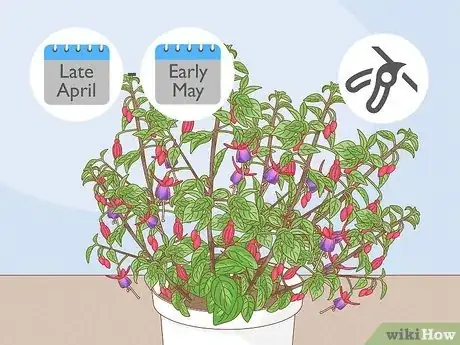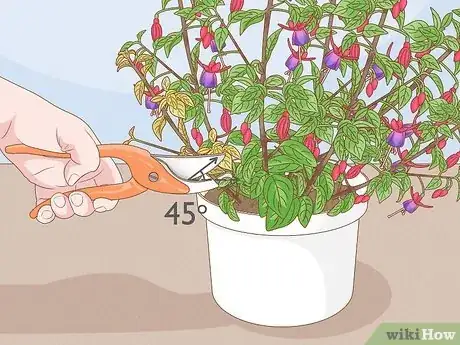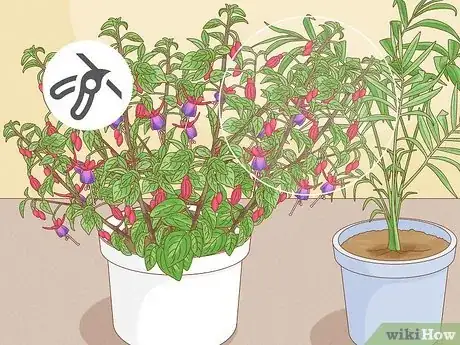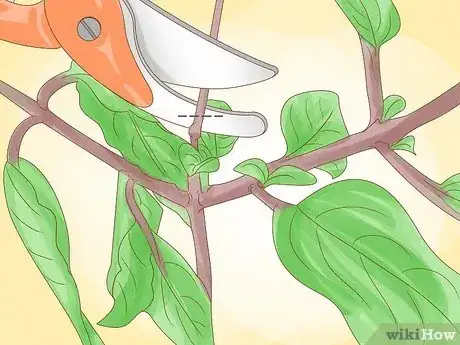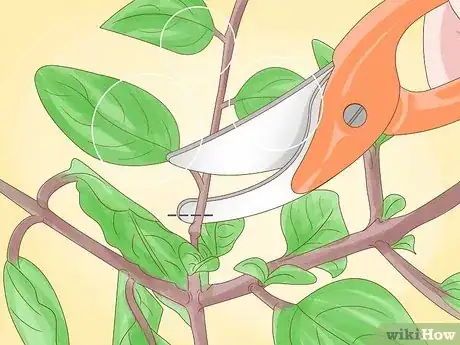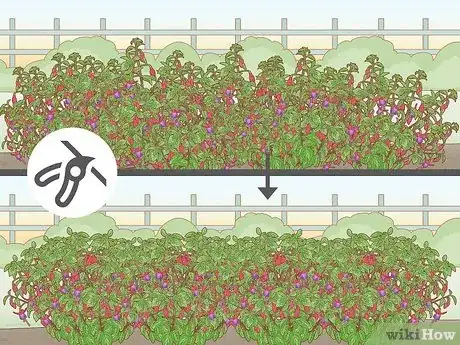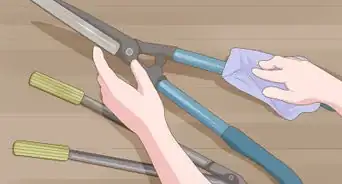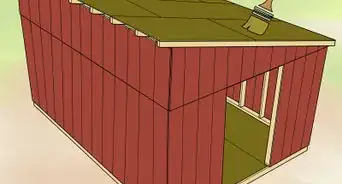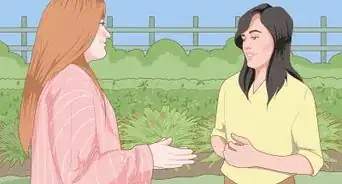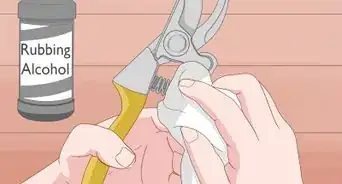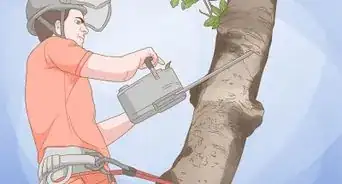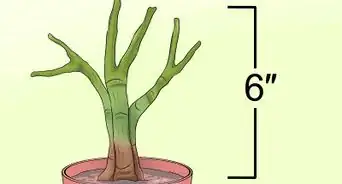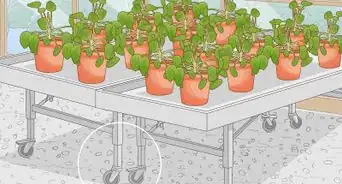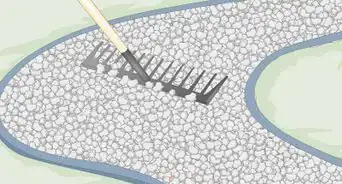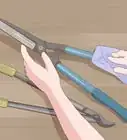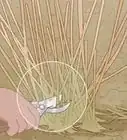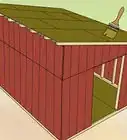X
This article was co-authored by Maggie Moran and by wikiHow staff writer, Hunter Rising. Maggie Moran is a Professional Gardener in Pennsylvania.
There are 7 references cited in this article, which can be found at the bottom of the page.
This article has been viewed 58,388 times.
Fuchsias come in many varieties, from hedges to flowering baskets, and produce beautiful purple flowers. Though fuchsias are typically treated as annuals, they can be cut back and grown again the following year.[1] You should plan on pruning twice a year, once during the spring and once during the summer to have a healthy, flowering fuchsia plant!
Steps
Part 1
Part 1 of 2:
Pruning at the Start of Spring
-
1Use hand shears or snips for pruning. Make sure your tools are sharpened before you use them. Sanitize your tools with rubbing alcohol before and after you cut each plant. This helps prevent the spread of bacteria and disease.[2]
- Purchase shears and snips at your local gardening store or online.
- Wear gardening gloves if you want to have an improved grip on the shears.
- In most cases, a sharp pair of household scissors should work for pruning fuchsias. Just make sure to sanitize them first.
-
2Wait until the last frost has passed to start pruning. The dead branches help protect the root systems from the frost. After the last frost date, which should happen in later April or early May depending on your area, you can take off the branches.[3]
- You may see new spring growth happening underneath the old branches before you remove them.
- If you live in the United States, you can use your ZIP code to check the expected last frost date here: https://garden.org/apps/frost-dates/ from the surface of the ground.”|}}
Advertisement -
3Make a 45-degree cut to remove any dead or broken shoots. Snip the branch at the base of the plant or where the wood is healthy. Leave darker colored wood and cut away pale or faded wood. If a branch is broken, make your cut just below the break.[4]
- Cuts made at an angle will help water run off the stem and prevent any fungal diseases.
- The leaves on fuchsia branches will be brown and withering while any new growths that have developed will have green leaves.
- It will look like you're removing almost the entirety of the plant, but it will regrow.
-
4Cut one-third of the length off of healthy branches. Make your cut at a 45-degree angle to prevent disease. Cutting back will help promote more healthy growths and will help keep your fuchsias a uniform size.[5]
- Only do this for growths from the previous season. The current season's growth will be small if it's present at all.
Advertisement
Part 2
Part 2 of 2:
Shaping Your Fuchsias in the Summer
-
1Remove any branches that interfere with other plants. Cut your fuchsias back so they are contained in their area. Any plants that crowd together will compete for sunlight and resources, making them grow less efficiently.[6]
-
2Prune the growing tip on stems to promote branching. The end of each new branch will continue to grow outwards if left on your fuchsia. Make your cut above the knobby spots on the stem where leaves grow on the stem, otherwise known as a node.[7]
- Flowering will be delayed until later in the season, but your fuchsia will produce more flowers for a longer amount of time.
- Long branches will get heavy with leaves and flowers and could break under strong winds.
-
3Cut above nodes that have 2 leaves. Leaf nodes will split into 2 or 3 individual branches that produce more flowers when they're cut back. Count up from the main stem to the second or third node with 2 leaves and make your cut.[8]
- The leaves on each node will grow on the opposite side of one another. This makes new branches spread out.
-
4Trim fuchsia hedges to a uniform height and width. Remove any spindly branches growing inside the shrub. This helps the air flow through the plant and prevents fungal disease. Keep hedges clean and shaped.[9]
- Use a larger pair of hedge shears to cut a large area in a short amount of time.
Advertisement
Expert Q&A
Did you know you can get expert answers for this article?
Unlock expert answers by supporting wikiHow
-
QuestionWhen should you cut back penstemon?
 Maggie MoranMaggie Moran is a Professional Gardener in Pennsylvania.
Maggie MoranMaggie Moran is a Professional Gardener in Pennsylvania.
Home & Garden Specialist
-
QuestionHow do you prune hydrangeas?
 Maggie MoranMaggie Moran is a Professional Gardener in Pennsylvania.
Maggie MoranMaggie Moran is a Professional Gardener in Pennsylvania.
Home & Garden Specialist
-
QuestionWhen should you cut back fuchsias?
 Maggie MoranMaggie Moran is a Professional Gardener in Pennsylvania.
Maggie MoranMaggie Moran is a Professional Gardener in Pennsylvania.
Home & Garden Specialist
Advertisement
Things You'll Need
- Hand shears
- Garden snips
- Pruning gloves
References
- ↑ https://s3.wp.wsu.edu/uploads/sites/2073/2014/04/9-28-03-Wintering-Fuchsias.pdf?x94038
- ↑ http://gardeningsolutions.ifas.ufl.edu/care/tools-and-equipment/disinfecting-tools.html
- ↑ https://www.independent.co.uk/property/gardening/gardening-for-idiots-when-to-cut-back-a-woody-fuchsia-and-dealing-with-past-its-best-echinac-a6684591.html
- ↑ https://youtu.be/RMfc_e250RI?t=51s
- ↑ http://www.rnzih.org.nz/Plant_Doctor/WG177_Pruning_fuchsias.htm
- ↑ https://www.independent.co.uk/property/gardening/gardening-for-idiots-when-to-cut-back-a-woody-fuchsia-and-dealing-with-past-its-best-echinac-a6684591.html
- ↑ http://www.rnzih.org.nz/Plant_Doctor/WG177_Pruning_fuchsias.htm
- ↑ https://youtu.be/2k1z8UPYAjs?t=1m
- ↑ http://www.americanfuchsiasociety.org/articledirectory/prune-fuchsias-for-beauty/
About This Article
Advertisement

